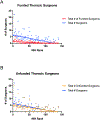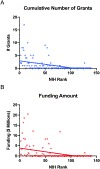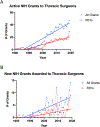Longitudinal analysis of National Institutes of Health funding for academic thoracic surgeons
- PMID: 33676759
- PMCID: PMC8329128
- DOI: 10.1016/j.jtcvs.2021.01.088
Longitudinal analysis of National Institutes of Health funding for academic thoracic surgeons
Abstract
Objective: National Institutes of Health (NIH) funding for academic (noncardiac) thoracic surgeons at the top-140 NIH-funded institutes in the United States was assessed. We hypothesized that thoracic surgeons have difficulty in obtaining NIH funding in a difficult funding climate.
Methods: The top-140 NIH-funded institutes' faculty pages were searched for noncardiac thoracic surgeons. Surgeon data, including gender, academic rank, and postfellowship training were recorded. These surgeons were then queried in NIH Research Portfolio Online Reporting Tools Expenditures and Results for their funding history. Analysis of the resulting grants (1980-2019) included grant type, funding amount, project start/end dates, publications, and a citation-based Grant Impact Metric to evaluate productivity.
Results: A total of 395 general thoracic surgeons were evaluated with 63 (16%) receiving NIH funding. These 63 surgeons received 136 grants totaling $228 million, resulting in 1772 publications, and generating more than 50,000 citations. Thoracic surgeons have obtained NIH funding at an increasing rate (1980-2019); however, they have a low percentage of R01 renewal (17.3%). NIH-funded thoracic surgeons were more likely to have a higher professorship level. Thoracic surgeons perform similarly to other physician-scientists in converting K-Awards into R01 funding.
Conclusions: Contrary to our hypothesis, thoracic surgeons have received more NIH funding over time. Thoracic surgeons are able to fill the roles of modern surgeon-scientists by obtaining NIH funding during an era of increasing clinical demands. The NIH should continue to support this mission.
Keywords: NIH funding; basic science research; grants; thoracic surgery research.
Copyright © 2021 The American Association for Thoracic Surgery. Published by Elsevier Inc. All rights reserved.
Figures






Comment in
-
Commentary: The National Institutes of Health and why we care.J Thorac Cardiovasc Surg. 2022 Mar;163(3):882-884. doi: 10.1016/j.jtcvs.2021.02.026. Epub 2021 Feb 16. J Thorac Cardiovasc Surg. 2022. PMID: 33712233 No abstract available.
-
Commentary: National Institutes of Health-funded cardiothoracic surgeon-scientists: A scar is forming in the wound.J Thorac Cardiovasc Surg. 2022 Mar;163(3):884-885. doi: 10.1016/j.jtcvs.2021.02.025. Epub 2021 Feb 16. J Thorac Cardiovasc Surg. 2022. PMID: 33712238 No abstract available.
-
Commentary: Thoracic research funding: Staying power is only one issue.J Thorac Cardiovasc Surg. 2022 Mar;163(3):880-881. doi: 10.1016/j.jtcvs.2021.02.050. Epub 2021 Feb 19. J Thorac Cardiovasc Surg. 2022. PMID: 33726906 No abstract available.
-
Commentary: For thoracic surgeons, a strategic approach to the funding game.J Thorac Cardiovasc Surg. 2022 Mar;163(3):881-882. doi: 10.1016/j.jtcvs.2021.03.009. Epub 2021 Mar 10. J Thorac Cardiovasc Surg. 2022. PMID: 33812681 No abstract available.
References
-
- Mann M, Tendulkar A, Birger N, Howard C, Ratcliffe MB. National institutes of health funding for surgical research. Ann Surg 2008;247(2):217–221. - PubMed
-
- Ratcliffe MB, Howard C, Mann M, del Nido P. National institutes of health funding for cardiothoracic surgical research. J Thorac Cardiovasc Surg 2008;136(2):392–397; discussion 398–399. - PubMed
Publication types
MeSH terms
Grants and funding
LinkOut - more resources
Full Text Sources
Other Literature Sources

